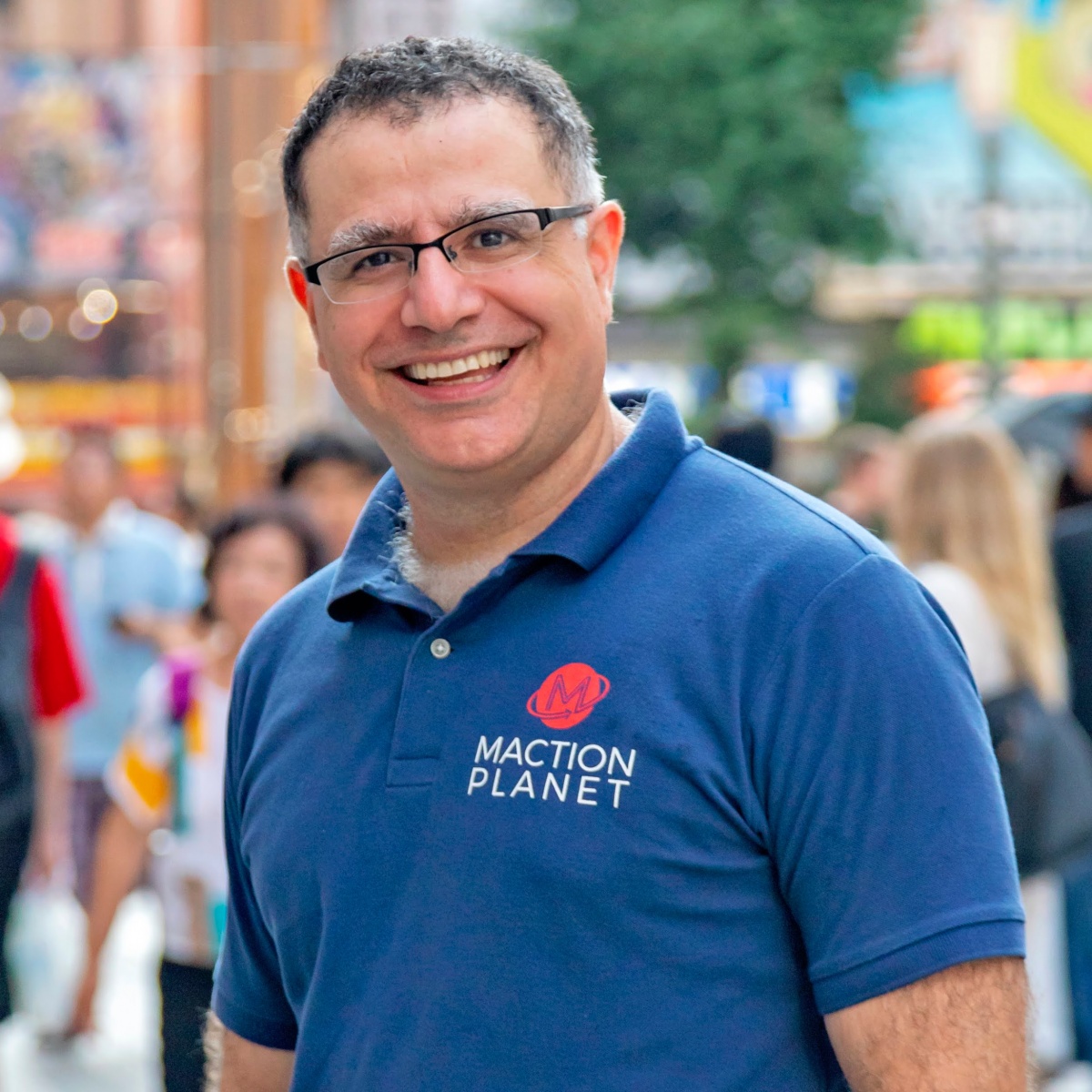Teenage Beer Brewer to Shochu Prophet
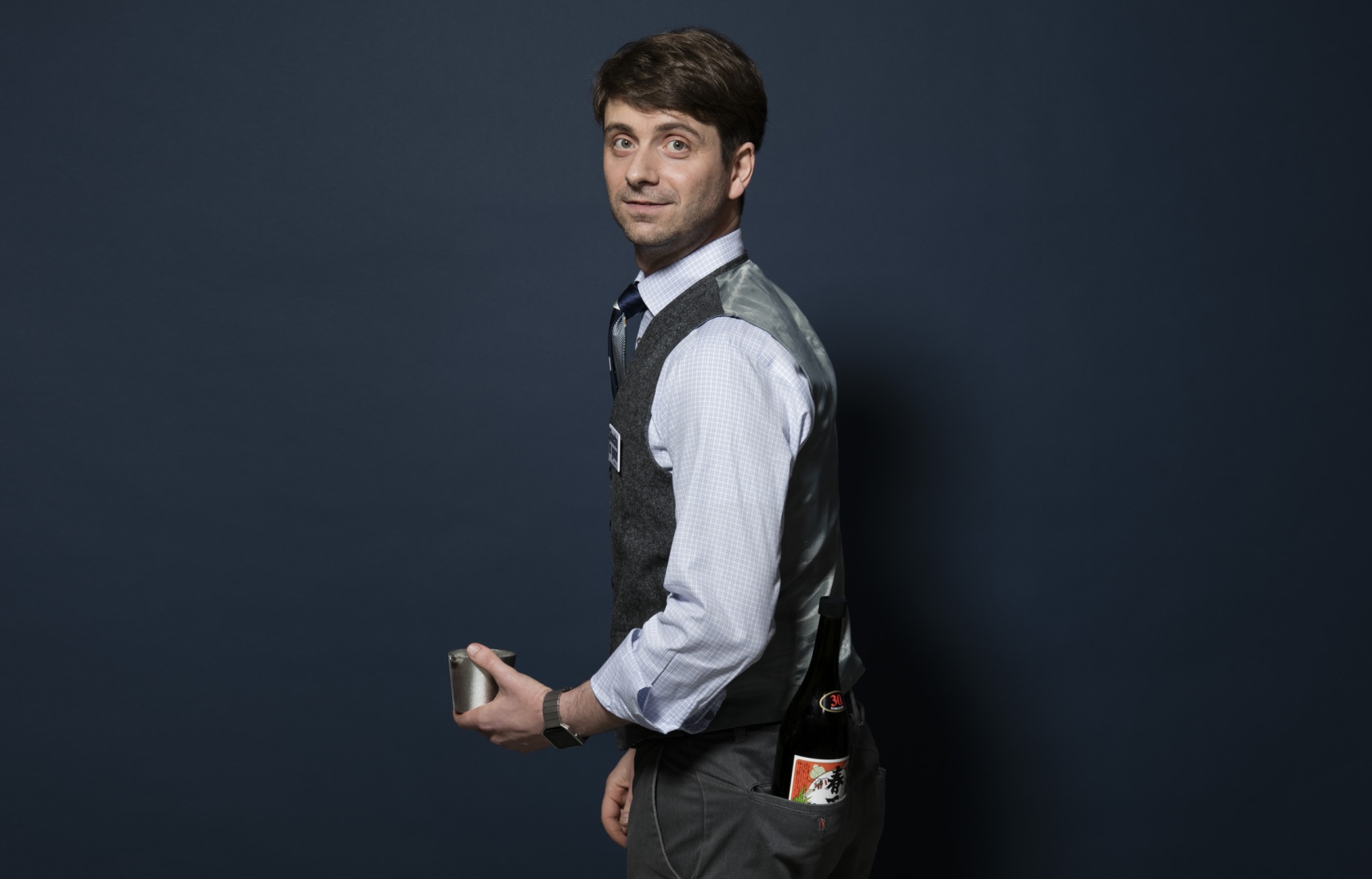
Christopher Pellegrini found a fascination for brewing while still in high school in Vermont. After arriving in Japan, he turned that fascination into a passion for shochu and awamori, two underappreciated alcoholic beverages with a long tradition of small-batch brewing in Japan. Pellegrini spoke with AllAbout’s Mac Salman about his life.
By Mac Salman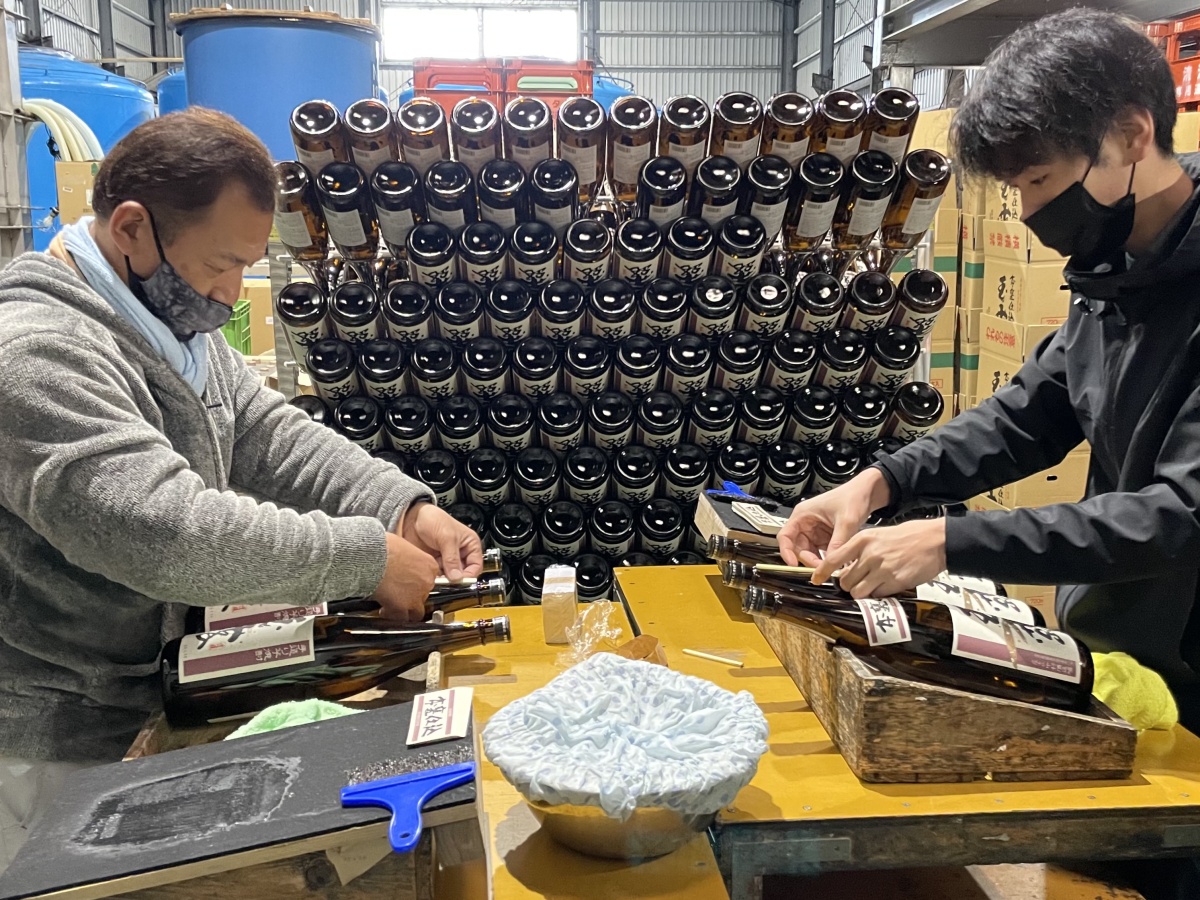
Applying labels by hand at Nakamura Shuzojo
Christopher, tell us a bit about your Japan journey?
It’s been an incredible ride. I followed my partner, now wife, here on what was supposed to be a one-year stay in 2002, and we haven’t left. She decided to go to grad school, and I made great friends and communities at work, the baseball stadium, and the beverage alcohol industry in the interim.
And how did your journey to shochu begin?
As a teenager, I started secretly brewing beer at home after learning about illicit beverage alcohol production during a history project at school. I eventually got in trouble for that–it was inevitable, really–but the fire had been lit, and I talked my way into a job at the local craft brewery. Long story short, I soon found myself up on the brewing platform, the youngest commercial brewer in the U.S. at the time. I was too young to drink the beer that I brewed.
How did the switch from beer to shochu come about?
That early experience instilled an intense appreciation for small-batch drinks, and for a long time I wanted to open my own brewpub. When I ended up in Japan on what was supposed to be a one-year visit, my passion for micro-scale drinks ran headlong into the shochu and awamori industry. It was a match made in heaven. I haven’t looked back.
Most people are now aware of sake, but what exactly are the alcoholic drinks shochu and awamori?
They’re basically Japan’s best-kept secrets. That probably sounds like hyperbole, but if you dig into the numbers you’ll realize that I’m not entirely crazy. Or even partly crazy–at least on that one point. Shochu and awamori are Japan’s indigenous spirits, and they’re made from agricultural products that are cultivated here in Japan.
Is the process very different from sake?
I’ll give you the “executive” summary. Authentic, old-school awamori and shochu are single pot-distilled spirits made from approved ingredients, their koji, and without the use of any additives. These spirits smell and taste like what they are made from–a production goal that naturally results in a lower ABV—Alcohol by Volume—but also a more aromatic beverage. Thanks to their mid-weight alcohol content, shochu and awamori are generally enjoyed alongside food in Japan.
Is it fair to say that, unlike sake, shochu has yet to become popular overseas?
110 percent fair. My personal take is that the awamori and shochu industries were lulled into a false sense of confidence by a few periods of impressive domestic growth during the 30 years leading up to the Tohoku earthquake, tsunami, and nuclear plant meltdown in 2011. Not that the compounding disasters directly influenced the drop in domestic sales that came a few years later, but it’s a convenient marker. Prior to that, shochu and awamori sales were growing, nihonshu was on the opposite slope, at least domestically.
"The best advice I can give is to seek out a decent liquor shop. Reputable liquor stores will stock more than just the mass-market brands, and that’s important. "
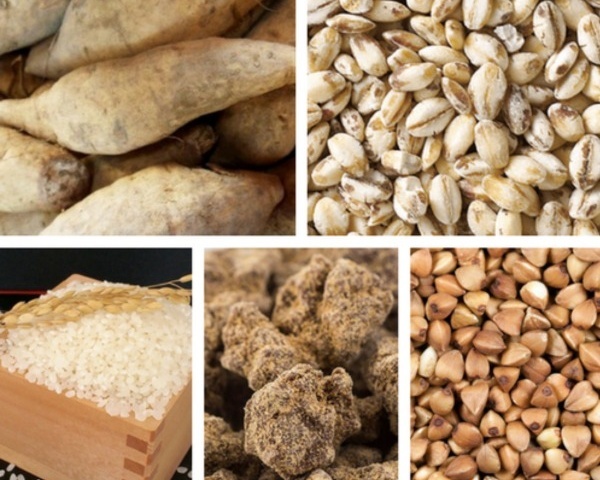
Some of the varied ingredients from which shochu can be made
And what happened?
When sales stalled in Japan, the shochu and awamori industry was caught flat-footed. They didn’t have the decades of international sales, distribution, and marketing experience that the nihonshu industry has amassed. And because nihonshu has been sold at sushi bars and Japanese-leaning restaurants overseas since the 70s, there’s a substantial support network in place to welcome new makers and products. Shochu and awamori enjoy very little of that. The industry is at least 30 years behind its nihonshu counterpart.
What advice do you have for people living in or visiting Japan who want to explore the world of shochu, but are daunted by the selection or their lack of knowledge?
Great question. The best advice I can give is to seek out a decent liquor shop. Reputable liquor stores will stock more than just the mass-market brands, and that’s important. But it also means that the ‘tyranny of choice’ quotient will be amped up a few decibels in such establishments.
What would you recommend they do?
Focus on the base ingredient. Rice is fruity and floral, barley makes it easy to comprehend for beer and whisky drinkers, and kokuto sugar shochu has a flavor profile that may appeal to rum drinkers. Soba and sesame have a nutty and grainy fragrance that many people enjoy.
"Sweet potato shochu is an acquired taste to be sure, but one that serious spirits aficionados will quickly understand."
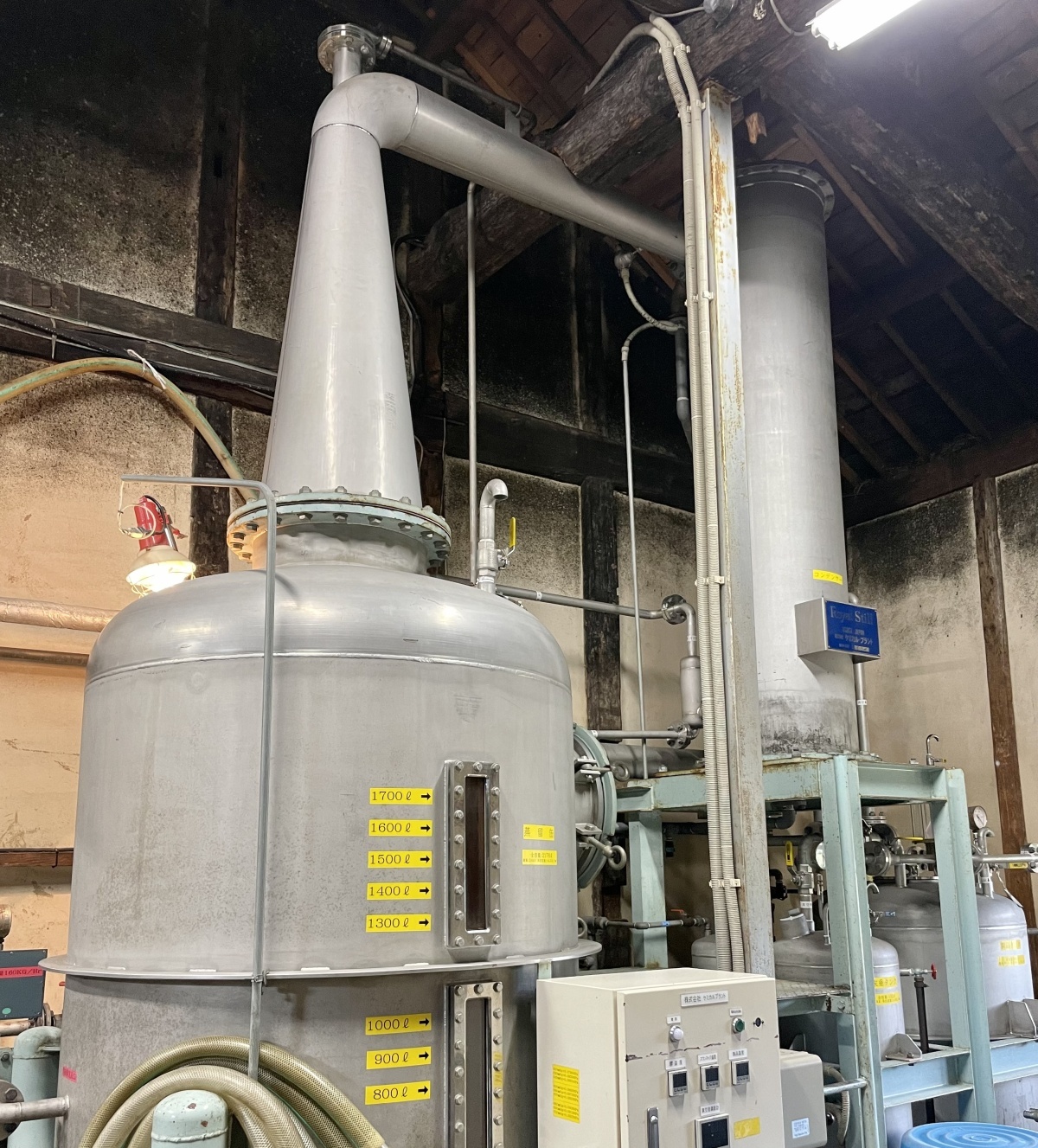
A pot still at Fujii Jozo
Why are the ingredients so important?
Because Japan’s indigenous spirits are single batch distilled in a pot still. Yes, you heard right, and it is indeed rare! Japan’s traditional spirits traditions have always traded high alcohol content for maximized flavor and aroma. Authentic (honkaku) shochu can be made from dozens of approved ingredients, so I can confidently argue that it’s the most diverse spirits class on the planet. You’ve never experienced anything like it.
Do you have suggestions on how to drink it?
Just let me remind everyone that shochu and awamori are typically bottled at 25-30% ABV. If you’re a wine drinker, then that probably sounds crazy high, but it’s not. Why? Because we tend to mix shochu and awamori with other liquids, usually mineral or sparkling water. If you’re into spirits and cocktails, however, then the ABV range is relatively low. Most standard world spirits–-whisky, gin, tequila, rum–are no less than 40% ABV in the bottle, and much of the most sought-after stuff is above 45%. Drinking shochu and awamori on the rocks is common, as are highballs.
And for those who like their spirits neat?
Then I recommend starting with sweet potato shochu. We don’t regularly drink these spirits straight in Japan, but sweet potato shochu is the most vociferous in its attack, and not in a bad way. It’s an acquired taste to be sure, but one that serious spirits aficionados will quickly understand. Plus it’s the best-selling style in Japan. Long-aged awamori is another excellent purchase for tipplers who like something with a little character that is great on the rocks or with a little dilution.
What were the challenges you faced in setting up your New York-based import business, Honkaku Spirits?
My business experience is limited to Japan. While this was irreplaceable in finding and developing brands for export, it did little to prepare me for navigating U.S. spirits import regulations, pricing calculations, account activation, logistics planning, data collection and analysis, and about seven million other things that I had never done before. In short, I was in over my head.
"I met some of my closest friends while cheering for the Yakult Swallows baseball team."
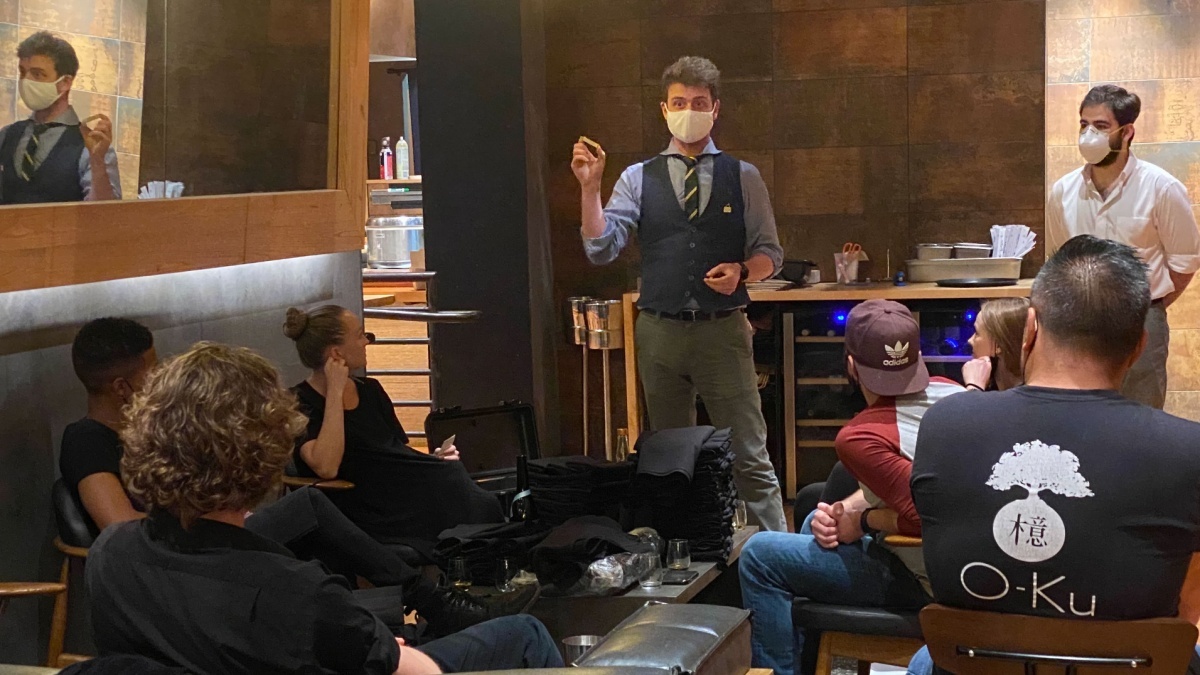
Christopher leading a staff training session in the US
And how did you keep from drowning?
Thanks to my experience here in Japan, I knew what questions I needed to ask and was able to identify areas where I was irreparably out of my depth. We brought in people with the experience and skillsets to fill in the gaps and make sure that we didn’t end up dead in the water, so to speak.
As part of your evangelism, you host two drinks podcasts.
Thank you for the opportunity to shout them out. I’m the shochu/awamori nerd on “Sake On Air,” a heavily nihonshu-focused podcast featuring some incredibly talented Japan-based professionals (yours truly not included). I also co-host “Japan Distilled” with Stephen Lyman, author of The Complete Guide to Japanese Drinks. We’re now in season two. Shochu and awamori are front of mind, but we spend a lot of time talking about Japanese whisky, rum, and gin as well.
You have other interests, including baseball. How did you become a Tokyo Swallows fan?
I’m from Vermont, a state that will likely never in my lifetime have a top-tier professional sports team. But Tokyo has several, and about 20 years ago I settled in with one of the less glamorous outfits. I’m eternally grateful to the “birds” because I met some of my closest friends while cheering for them. They somehow won the Japan Series last year, which I still haven’t gotten used to acknowledging.
You even host a Swallows podcast, right?
It’s true, I do. And the baseball podcast is way older, although less prolific, than either of the drinks-related podcasts mentioned earlier. I have no idea how many people listen to that semi-monthly podcast, but if you’re one of them, then bless your cotton socks.
What occupies your time other than shochu and baseball?
Free time? When I can eke out a little time between meetings and content development, I try to get a little exercise or read about a drink that I don’t know a whole lot about. Recently I’ve been learning about mezcal, sherry, and other fortified wines. The great thing about being in the food and beverage industry is that the education never ends. Kanpai!


